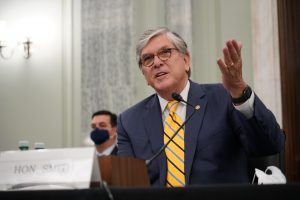NAB’s Smith tells Senate: ‘Americans Turn to Their Local Broadcasters First for the Most Trusted and Reliable Information’


Gordon Smith
NAB President and CEO Gordon Smith testified on Thursday (4/15) before the Senate Commerce Committee’s Subcommittee on Communications, Media, and Broadband to promote broadcasting as the best investment for the Administration’s vaccine-promoting advertising message, which is backed by over $1 billion in COVID-19 aid funding.
He spoke during the subcommittee hearing, “Shot of Truth: Communicating Trusted Vaccine Information,” on ways the media is disseminating vaccine information and what more TV, radio and online platforms can do.
Below are his remarks as prepared for delivery:
Good morning Chairman Lujan, Ranking Member Thune and members of the subcommittee. My name is Gordon Smith and I am the president and CEO of the National Association of Broadcasters. On behalf of the free and local broadcast stations serving your hometowns, I appreciate the opportunity to testify before you today about the unique and vital role that trusted local broadcasters are playing to effectively deliver vaccine information to their communities.
In times of emergency, Americans turn to their local broadcasters first for the most trusted and reliable information to stay safe and informed. Broadcasters’ guiding principle is to serve on the front lines of every crisis, staying on the air to provide critical information even, at times, when their own lives may be in danger.
Just over a year ago, all our lives were turned upside down by the COVID-19 pandemic. While the country shut down and many Americans worked from home, broadcasters scrambled to set up makeshift studios and modify camera and microphone equipment so they could continue reporting breaking news and sharing vital information.
Now, as hope abounds and vaccines roll out across the nation, broadcasters are anxious to serve again as critical partners to government agencies and the public health and medical communities, to arm listeners and viewers with timely, accurate information about vaccines.
Last fall, NAB partnered with the Reynolds Journalism Institute on a nationwide research project to identify effective vaccine education messaging. Our research yielded encouraging news and found a public eager for the vaccine. However, our research and numerous other studies identified challenges to vaccine acceptance, and greater hesitancy among certain demographics, such as African Americans, Hispanics, conservative-leaning Whites and women aged 18-34.
Our research showed that everyone simply wants the facts – news stories that make recommendations based on factual reporting. Fortunately, that is what broadcasters do best – they dig deep to provide accurate information to their communities – not spin, not rumors and without political theater.
Our survey research also showed local news to be the most reliable and trustworthy information source. Interestingly, social media was ranked least reliable by Americans. Our data demonstrates that the public values a trusted local source, especially the voices of local doctors, local nurses and local pharmacists. This research made it clear that a local and regional approach would be more effective than a one-size-fits-all national message.
With the highest reach of all media platforms into more than 90% of households, and a service that is ubiquitous and free to the public, broadcast radio and TV stations are the best message carriers to reach vulnerable populations. Local stations serve communities of color, multilingual ethnic minorities and rural areas of the country where vaccine hesitancy is highest.
Acknowledging this vast, unique and unparalleled reach, we appreciate the many senators – including members of this committee – that have worked over the past year to support broadcasters, providing CARES Act relief, and urging the administration to utilize local stations to educate Americans during the pandemic. We are gratified that the Department of Health and Human Services has identified local broadcast stations as effective advertising partners.
Additionally, NAB is proud to be a founding member of the Administration’s recently announced Community Corps, whose mission is to galvanize trusted messengers in local communities to encourage people to get vaccinated.
Since the early days of the pandemic, broadcasters have donated unprecedented airtime to keeping the public informed and to address mistrust and concern among vulnerable communities.
Local broadcasters have been a constant companion shining light, spreading hope and supporting communities as Americans have experienced acute isolation from their families, neighbors and loved ones.
As this pandemic has shown once again, localism and journalism are central to broadcasting’s franchise. Therefore, we are eager to continue to assist Congress, the Administration and local leaders by using our airwaves to carry the message America needs — and trusts — to get over the finish line with the COVID-19 pandemic. Further, as Congress considers how to best direct federal advertising dollars, we are confident that all broadcasters, especially those in small and rural markets, can drive these messages home better than any other medium.
Thank you again for the opportunity to testify today. I look forward to your questions.
***
Background
Information about radio and television broadcasters’ efforts to keep their communities informed during the pandemic is available through NAB’s “We Are Broadcasters” initiative here.
In addition, as part of NAB’s “Voices From the Field” series, NAB interviewed Mariela Romero, regional community empowerment director with Univision Atlanta, Philadelphia and Raleigh. Romero shared her personal journey in broadcasting and discussed the many ways Univision stations are helping educate Spanish speaking audiences about the COVID-19 vaccine and encouraging communities to get vaccinated.
